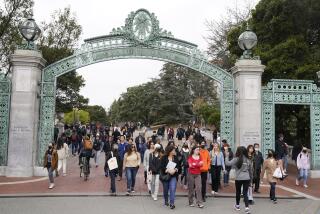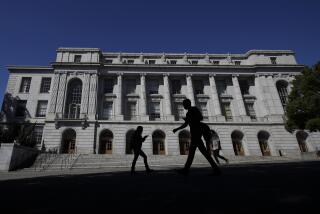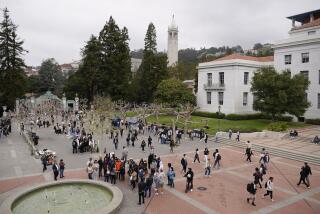Pepper spray report sharply criticizes UC Davis leaders, police
UC Davis police violated policy and used poor judgment in pepper-spraying student demonstrators in November, while school leaders badly bungled the handling of that campus protest, according to a highly critical report released Wednesday.
“Our overriding conclusion can be stated briefly and explicitly. The pepper spraying incident that took place on November 18, 2011 should and could have been prevented,” said the report by a university-appointed task force chaired by retired state Supreme Court Justice Cruz Reynoso.
The long-awaited study strongly rebutted campus police claims that the Occupy demonstrators who had pitched tents on a UC Davis quad posed a violent threat, and it said administrators wrongly assumed that many protesters were off-campus troublemakers.
The report, and an accompanying one by the Kroll security consulting firm, detailed “a cascading series of errors” and poorly timed efforts to evict the campers. It also questioned the legal basis for the operation.
The actions led to an international furor after an online video showing campus police Lt. John Pike repeatedly spraying the chemical irritant into the faces of seated students went viral. Pike and other police contend that the spray was the “most appropriate” tool on hand to deal with what they described as an unruly mob encircling the officers.
But Reynoso’s panel countered forcefully: “On balance, there is little factual basis supporting Lt. Pike’s belief that he was trapped by the protesters or that his officers were prevented from leaving the Quad. Further, there is little evidence that any protesters attempted to use violence against the police.”
After the incident, the University of California system and many other colleges examined how to balance the civil rights of protesters against the need for campus security at a time when the Occupy movement had gained traction around the country.
The appointment of the 13-member task force, which included UC faculty, students and alumni, was one response, as are other ongoing investigations.
The task force described campus Chancellor Linda Katehi’s leadership during the protests as inadequate and said she should have made it clear that she wanted police to use little or no force. Her failure to do so “substantially undermined the goal of avoiding a physical confrontation,” the study said.
It also criticized Katehi for advocating pushing police to evict students in the late afternoon to avoid what she feared might be raucous nighttime partying. Campus police wanted to act in the middle of the night when the crowd would be smaller and less prepared.
Campus Police Chief Annette Spicuzza was portrayed as leading “a dysfunctional chain of command,” with subordinates challenging her orders.
Pike not only lacked the proper cause to spray students, but he broke police rules by using a large and high-pressure canister that is not supposed to be deployed any closer than six feet from the intended targets, according to the experts from Kroll, headed by former Los Angeles Police Chief William J. Bratton.
John Bakhit, an attorney who represents the campus police union, said he “completely disagreed” with the study’s conclusion that Pike had no reason to use the pepper spray. He said the panel did not take seriously enough the threat police faced from “this large mob of people” who refused police orders to disperse.
Yet Bakhit welcomed the criticism of how administrators and the police chief planned and timed the evictions, putting the officers in a situation that he said might have been avoided.
After the report was made available online Wednesday, Reynoso and other task force officials discussed the findings with more than 200 students and faculty on campus. Katehi did not attend.
Some students said they were happy with parts of the report, although some wished it had been more forceful in advocating for changing or even eliminating the campus police force.
One student held a sign proclaiming: “UC Davis: #9 in public education #1 in political repression.”
Fatima Sbeih, 22, who was pepper-sprayed, said she was shocked — and pleased — that the report was so critical of the police action. “My heart stopped. I was like, oh my God, they actually admitted it,” she said.
Elizabeth Lara, 22, who was arrested but not sprayed Nov. 18, was disappointed that the police force won’t face a complete overhaul as a result of the study. “The report is pretty thorough. But the recommendations fall short,” she said.
The 190-page report was at the center of a legal fight over the last month as the police union sought to limit how much could be made public, contending that some parts violated privacy rules and put officers at risk. Earlier this week, UC and the union agreed that the full report could be released, but with officers’ names removed except for Pike and the police chief.
The report did not make any specific personnel recommendations but called on UC and UC Davis to review its police rules and training and for the campus to set up a better system for making decisions about protests. The document used interviews, logs, videos, emails and other evidence to create a minute-by-minute account of the confrontation.
Reynoso, a former UC Davis law professor, told reporters he expects policies to change. “We need to do a lot of work on this campus. Frankly, our report is pretty blunt about these things,” he said.
Pike, Spicuzza and an unidentified officer have been on paid administrative leave, and they and others still face a departmental investigation that could lead to disciplinary action.
Katehi, chancellor since 2009, faced calls this winter for her resignation, but she has apologized and beat back an attempt by some faculty to pass a no-confidence vote against her.
UC system President Mark G. Yudof made it clear Wednesday that he wanted Katehi to keep her job.
“Friday, Nov. 18 was a bad day for the UC Davis community and for the entire UC system. We can and must do better,” Yudof said in a statement. “I look forward to working with Chancellor Katehi to repair the damage caused by this incident and to move this great campus forward.”
In a statement, Katehi thanked the Reynoso panel and said the university will work to “ensure that students’ safety and free-speech rights are paramount.”
The UC regents and some state legislators, however, may push for additional, tougher changes.
Ten protesters were arrested in the November incident, but the Yolo County district attorney subsequently said no charges would be filed against them because of a lack of evidence. In February, 19 students and alumni who were sprayed or arrested filed a federal lawsuit claiming violations of their free speech and assembly rights.
Meanwhile, a separate committee headed by UC Berkeley law school Dean Christopher Edley is looking at wider issues about how campuses should react to future student protests. That group’s recommendations are expected to be released in the next month or two, officials said.
Gordon reported from Los Angeles and Megerian from Sacramento.
More to Read
Start your day right
Sign up for Essential California for news, features and recommendations from the L.A. Times and beyond in your inbox six days a week.
You may occasionally receive promotional content from the Los Angeles Times.








